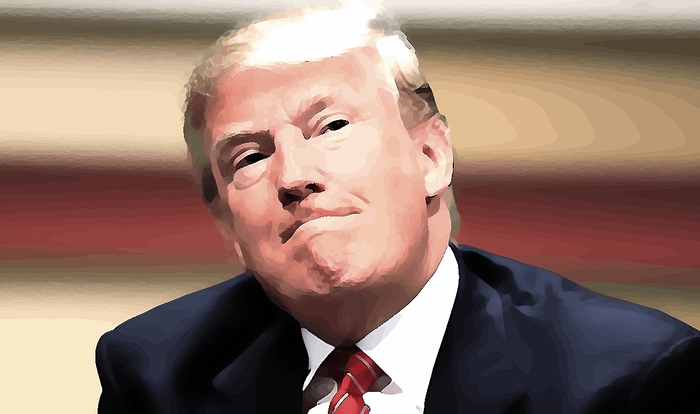
Less than two months into his presidency, Donald Trump faces a pivotal week ahead, with plans to address GOP lawmakers who are jittery about key aspects of his legislative agenda and to roll out a new travel ban in a fashion that will ease doubts about his administration's competence.
President Trump's speech Tuesday to a joint session of Congress comes as fellow Republicans are returning to Washington after raucous town hall meetings where they've faced crowds angered by the lack of a coherent plan to replace the Affordable Care Act after its promised repeal.
The new president is under growing pressure from his own party to offer specifics on that front as well as on his pledge to provide sweeping tax reform - another issue on which promises of bold action are threatened by divisions among Republicans and a lack of clear direction from Trump.
Trump's prime-time address Tuesday will have ramifications far beyond Capitol Hill: It offers a president with sagging job-approval numbers an opportunity to recast his agenda for the American people and to change the focus of news coverage that has been dominated in recent days by stories about his campaign's contacts with Russia.
Whether Trump will provide enough direction to satisfy fellow Republicans remains unclear. White House press secretary Sean Spicer said Sunday that his speech will be cast in largely broad strokes, touching on an array of topics including health care, jobs, infrastructure and border security.
Trump has said he will offer detailed plans on health care and tax policy around the middle of next month, issues that will be on the agenda today when Trump is set to meet jointly with Senate Majority Leader Mitch McConnell, R-Ky., and House Speaker Paul Ryan, R-Wis.
Many in the party say clarity on such issues needs to come sooner rather than later for Trump to seize the mantle on issues that could go a long way toward determining fate of his presidency.
"On many of these issues, President Trump will be the referee; he'll be the tiebreaker," said Rep. Luke Messer, R-Ind., the House Republican Conference's policy chairman. "I do think the sooner he makes clear his preferences the better, because it will help us work through these policy debates within our own party. My guess is some of that will start [Tuesday] night."
Today, Trump is expected to direct federal agencies to help him craft a budget that focuses on scaling up the military but also includes "big cuts" to the Environmental Protection Agency and foreign aid, among other targets.
Trump's directive, although not binding in the budget process, suggests a sense of priorities as Trump seeks to look assertive in controlling spending and putting his priorities out front.
Trump's trip to the Capitol on Tuesday is not officially a "State of the Union" address but it will have many of the trappings of such visits. Both Trump and Vice President Mike Pence are planning to travel outside Washington later in the week to reinforce their priorities - something administrations typically do following agenda-setting speeches.
Through a series of executive orders in his first five weeks, Trump has set the framework on several initiatives, including stepped-up immigration enforcement and cutting regulations on businesses. He has also nominated a judge to the Supreme Court with strong conservative credentials.
But Trump can claim no major victories so far in Congress, where he is seeking an array of bold initiatives, including what aides say is a forthcoming infrastructure package.
"Despite some of the spin the White House is putting out about how much progress they've made on their legislative agenda, I'm not sure many Republicans see much progress on two key issues - health care and tax reform - and they're getting a little nervous," said Jim Manley, a lobbyist who was a longtime aide to former Senate minority leader Harry Reid, D-Nev.
Republican lawmakers are now hustling to assemble health-care legislation that addresses dueling concerns within the party. On one hand, they are eager to fulfill seven years of promises to repeal the Affordable Care Act and lessen the federal government's role in health care. On the other hand, many are wary of roiling insurance markets and rolling back the ACA's expansion of Medicaid, a program that covers 76 million Americans.
"I think there are some very conservative Republicans in the House who are going to say, just get rid of the whole thing," Ohio Gov. John Kasich, R, said Sunday on CBS' "Face the Nation." "That's not acceptable when you have 20 million people or 700,000 people in my state, because where do the mentally ill go, where do the drug addicts go?"
Rep. Jim Jordan, Ohio, one of the House Republicans who opposes maintaining the Medicaid expansion or other Obamacare programs, retorted on ABC's "This Week": "We didn't tell the American people we're going to repeal it except we're going to keep the Medicaid expansion . . . We told them we were going to repeal it and replace it with a market-centered, patient-centered plan that actually brings back affordable health insurance."
Asked if he was confident there were votes in Congress for that, Jordan said, "We better have the votes for that, because that's what we told the people."
Trump and his deputies have offered little guidance on specific steps, and he has passed up opportunities to do so. In a January address to a Republican congressional retreat in Philadelphia, Trump offered no new details on what provisions he wants to see.
Any health-care legislation will require making major trade-offs between coverage levels and government spending that will ultimately affect millions of Americans, and Trump has committed to keeping two costly ACA mandates: requiring insurers to cover applicants who have preexisting health conditions, and allowing children younger than 26 to remain on their parents' health plans.
Trump also said repeatedly on the campaign trail that he would not touch Medicaid - a promise that is at odds with the plans of House Republicans.
White House spokeswoman Sarah Huckabee Sanders said Sunday during an appearance on ABC's "This Week" that nothing has changed on that front.
At town hall events across the country last week, pro-ACA activists and others pushed GOP lawmakers to explain how their plan would affect those now covered. Without key debates resolved on tax incentives, coverage requirements and the fate of Medicaid, lawmakers have largely responded in generalities.
"Health care can be a very stressful thing," Sen. Tom Cotton, R-Ark., who faced a furious crowd of more than 2,000 constituents last week, said Sunday on NBC's "Meet the Press." "That's why when we repeal Obamacare, we have to get it right."
Trump is facing similarly hard choices on tax reform, where Ryan is pushing a major change to the corporate income tax known as "a border adjustment tax," under which companies' imports would be taxed but their exports would not be.
That concept would appear to be compatible with Trump's preference for hefty border tariffs, and it could also offset the cost of a major reduction in corporate tax rates that Trump has promised. But some economists say it would raise the price of imported goods in the U.S. and complicate existing free trade agreements.
In an interview Thursday with Reuters, Trump said border adjustment "could lead to a lot more jobs in the United States" but did not explicitly endorse it. He had previously told the Wall Street Journal that it was "too complicated."
Ryan has set out an aggressive timeline for passing a tax reform bill, eyeing passage by year's end. Last week, Pence said he and Trump would deliver tax relief "by summertime." But that schedule assumes that Republicans don't get bogged down in health-care legislation over the next six weeks.
In the nearer term, Trump has pledged to issue a new executive order this week in the wake of judges blocking a previous directive that sought to restrict travel to the United States by refugees and people in seven majority-Muslim countries.
The first order was rolled out hastily and led to confusion across the globe. Spicer said last week that the administration is coordinating widely on the second attempt and that it will be "implemented flawlessly."
Previously:
• /10/20/16: Debates have revealed real weaknesses for Hillary that could nag at her in the campaign's final days and, if she wins, hamper her ability to pull the country together and govern effectively
• /10/05/16: Kaine's debate performance threatens to undercut his pick for Clinton veep: Image of authenticity
• /09/12/16: GOTCHA! Clinton memo revealed: Pressed about the 'deplorables' comment? Accuse the media of a double standard
• /07/04/16: Does Hillary Clinton really need Elizabeth Warren on the ticket?


 Contact The Editor
Contact The Editor
 Articles By This Author
Articles By This Author